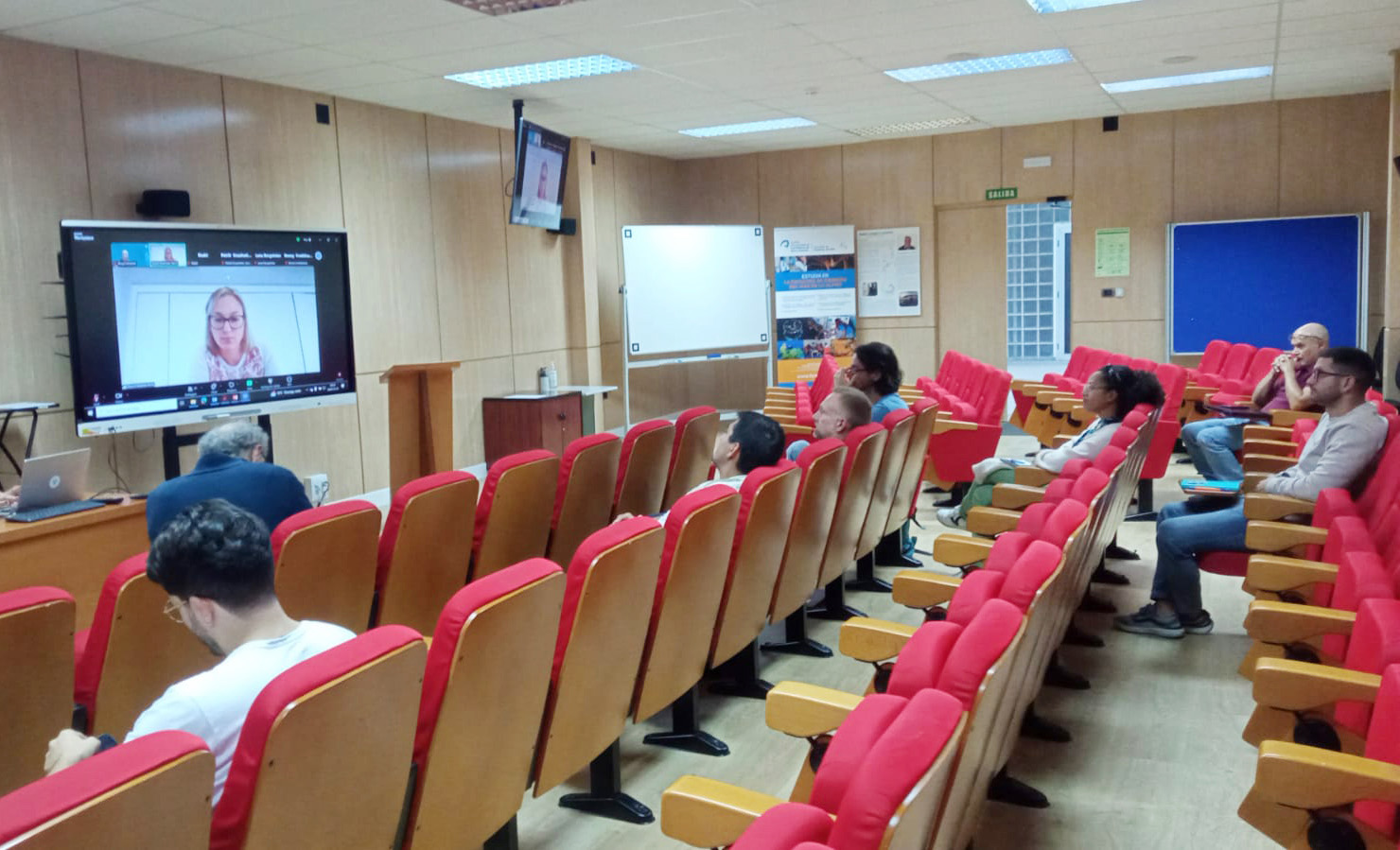Three young researchers from the ULPGC and three from the Scandinavian institution show their research work in order to establish collaboration links in the future with stays at both universities
The Biodiversity and Conservation research group (BIOCON) of the University Institute ECOAQUA, belonging to the University of Las Palmas de Gran Canaria (ULPGC), advances in its internationalisation process by developing a joint seminar with young researchers from this academic institution and the Swedish University of Agricultural Sciences - Aquatic Resources (SLU) in order to find synergies and links between the research lines of both entities and carry out future collaborations.
The seminar, held in webinar format last week, included talks given by junior researchers Víctor Cordero and Eros Geppi, both of whom are currently working on their doctoral theses, as well as by the young doctor Néstor E. Bosch. They presented the main lines of their respective current research with the aim of exchanging information with researchers from the Swedish university in order to develop joint work in the future.
Under this premise, the scientists Diana Hammar Perry, Josefin Sundin and Matilda Andersson, from this Swedish university, which has several research centres spread throughout the Scandinavian country, both on the East and West coasts, also took part.

This activity, which also aims to create working groups in various marine fields, such as ecosystem services, spatial planning, ecosystem modelling, marine ecology, among others, is part of the collaboration agreement signed by the two institutions to facilitate the exchange of students and research stays.
As a result of this agreement, different initiatives have been developed, among them ULPGC professor Rodrigo Riera, PhD in Marine Ecology from the University of La Laguna, specialising in Zoology, and member of ECOAQUA's BIOCON Group, gave a talk in Sweden last year on ECOAQUA's work and on his line of research as a scientist on the effects of human disturbance on the diversity and function of coastal communities, while SLU professor Birgit Koehler, through an ERASMUS funding programme, worked for two months at the Canarian university.
In the words of Riera, who presented and closed the event together with Professor Ricardo Haroun, director of ECOAQUA, and the aforementioned Birgit Koehler from SLU, with actions like these ‘we give a great opportunity to young researchers from here so that they can spend time with other researchers from this powerful Swedish university in order to deepen their studies and, on the other hand, so that Swedish researchers from the Canary Islands can work with other researchers from this powerful Swedish university in order to deepen their studies. On the other hand, Swedish researchers can come to our university and acquire knowledge and ways of working that are also new to them, in order to enrich the studies they carry out at their institution’.
In this sense, says Rodrigo Riera, at the ULPGC, through ECOAQUA, ‘we have a great scientific productivity benefited by our oceanic location that offers a wider range of study than that provided, in this case, by the Baltic Sea, so our great strength is marine ecology, while Swedish researchers are very good at developing models. This collaboration is therefore a ‘win win’ strategy whereby we gain in learning how to do scientific modelling and they gain in the field of marine ecology. In this way, we bridge the gap between the different fields of science, which are enormously broad.
In this way, he points out, ‘we give practical content to one of the almost thirty agreements we have signed with institutions around the world which, after this seminar, will be followed in January with another webinar and a stay at the ULPGC by a Swedish researcher and, over the course of next year, with another stay in Sweden by Joana Vasconcelos, a Portuguese researcher working with us, and two of her PhD students with the aim of studying otoliths, which are calcareous concretions in the brains of fish that act like tree trunk rings and make it possible to determine the age of species, something that allows, among other things, the identification of fish stocks.
Three lines of research
The seminar showed, on the one hand, the advances achieved in the studies on ecosystem services, the work of Víctor Cordero-Penín, which are those benefits that humans use from the environment, such as, for example, fishing or alginate from marine algae for the manufacture of toothpaste or cosmetic products.
For his part, Néstor Bosch delved into his research on the functional traits of fish, such as their different trophic levels and the effects that their respective functions have on the marine ecosystem, starting from ecological questions based on a database created jointly with Australian researchers, the result of his thesis carried out in Australia, with the collaboration of Professor Rodrigo Riera, who has more than 8,000 dive data collection points around the world. In addition, he also discussed his research on black corals and marine species associated with rhodolithic seabeds.
Finally, Eros Geppi spoke about his studies on theoretical ecology, which essentially consists of transforming the ecological processes observed in the marine or terrestrial environment into mathematical equations.
Specifically, Geppi's research is covering the study of habitat fragmentation, which means that certain animal or plant species, instead of continuing to enrich the habitat or being totally destroyed, remain as small fragmented islands, in order to establish theoretical models with differential equations that elucidate how one of the factors in the loss of biodiversity on the planet is produced, on the one hand, by the destruction of habitats and, on the other hand, by the aforementioned fragmentation caused by human pressure or climate change.
This creates a framework for a series of questions about how these fragments are connected to each other or whether everything is the same at the centre or at the edges of these fragments produced by some human construction or as a result of a source of contamination.


